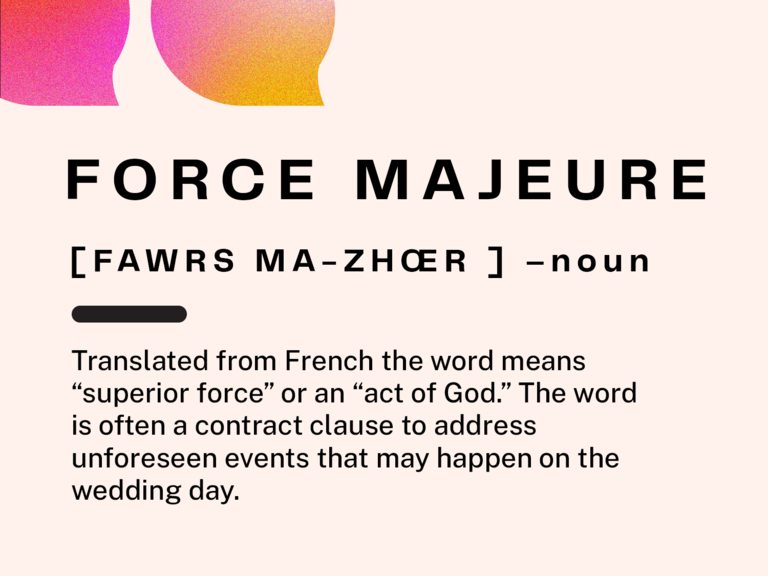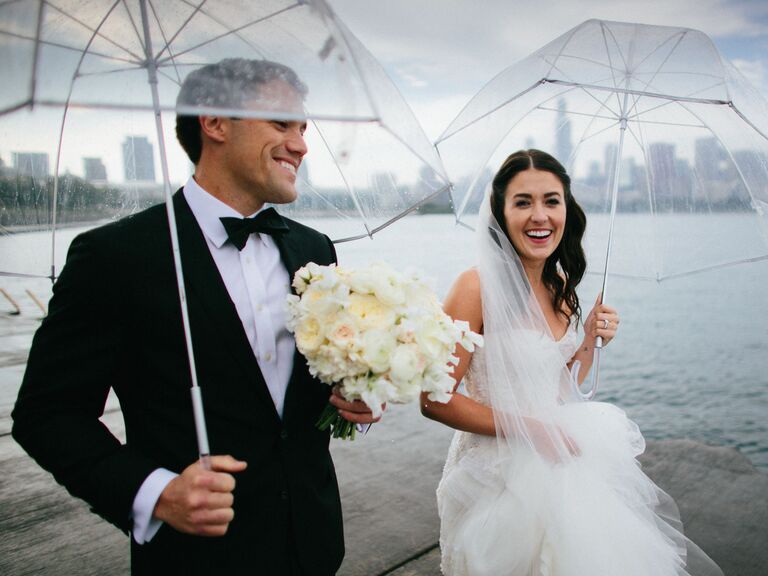How Knowing the Force Majeure Meaning Will Help Your Wedding
Even though weddings are magical events, no celebration is completely safe from an accident, weather-related emergency or governmental action. That's why you should know the force majeure meaning––a wedding planning term you've probably heard before. Simply put, this contract clause protects you from paying for expenses when unforeseeable events bring your wedding to a halt. And yes, wedding day forecast apps exist, but there's no sure-fire way to predict everything in advance. Learn the answer to the common question "What is force majeure?," how to pronounce the phrase (it's easier than it looks), where the provision originated and the top examples of the clause. As Benjamin Franklin, one of the Founding Fathers of the United States, once said, "By failing to prepare, you are preparing to fail."
Everything to know about Force Majeure: Meaning | Pronunciation | Origin | Example
Force Majeure Meaning

Wondering, "What does force majeure mean?" Translated from French, the phrase means "superior force" or an "act of God." A force majeure clause is often included in contracts to address unforeseen events that may happen on the wedding day.
What are the three elements of force majeure?
Three requirements need to occur for a force majeure clause in a wedding contract to be summoned. First, it must be determined that the unfortunate event is a part of the agreed-upon events on the contract. Second, the event must be unforeseeable without the possibility of being mitigated. Thirdly, it must be deemed that the performance of the contractual obligation was impossible to complete because of the unexpected circumstances.
Force Majeure Pronunciation
After learning the force majeure definition, many people are curious how it's pronounced. Before you talk with the head of staff about your reception venue contract, practice saying [fawrs ma-zhœr] before your meeting so you're confident talking about the clause. (Psst. The phrase sounds like a fancy way of saying "force major.")
What is another word for force majeure?
The wedding force majeure clause can also be said in other ways. Here are some synonyms for the popular phrase: freak accident, unavoidable casualty, act of God, inevitable accident, superior force and vis major.
Force Majeure Origin
The force majeure origin is said to be from French civil law. Many law historians believe the clause's modern use came from England. Attornies Joshua M. Cartee and William M. Mattes state that the force majeure history started with the 1863 Taylor v. Caldwell English court case. In this case, an event organizer made a deal with a venue owner to rent the establishment for four days and pay the owner on the day of each event. Unfortunately, before the contract could be carried out, the venue was destroyed by an accidental fire, which wasn't a scenario written into the contract. Since the agreement was based on the use of the venue, which couldn't be accomplished, the court came to this conclusion: "[I]n contracts in which the performance depends on the continued existence of a given person or thing, a condition is implied that the impossibility of performance arising from the perishing of the person or thing shall excuse the performance."
In 1883, the United States Supreme Court came in contact with its own force majeure issue. In The Tornado court case, the Supreme Court decided that the owner of a ship named Tornado didn't have to fulfill their requirement to deliver freight (based on the original contract) because an accidental fire happened before the voyage. The fire resulted in the contracted task being impossible to complete. Just as the two parties in the Taylor v. Caldwell case did, the two people failed to add a force majuere clause that addressed this kind of incident.
To this day, people around the world include the force majeure provision in contracts to protect both parties. Depending on the situation, unique adjustments can be made to this clause.
Force Majeure Example
Protecting your special day and other wedding-related events is crucial, so we always recommend you get wedding insurance. After checking that off your to-do list, you need to know what events are recognized in your contract. Here are some of the most common force majeure clause examples:
- war
- riots
- strikes
- invasions
- fire
- floods
- earthquakes
- hurricanes
A few things excluded from force majeure clauses in wedding contracts are economic conditions like stock market crashes or inflations. Another event you might be surprised isn't in modern force majeure provisions is COVID-19. There's debate whether COVID-19 is considered an "act of God." Plus, one of the parties has to prove that it makes the task contracted impossible to complete, and there's no possibility of the task or event being postponed. Citing economic hardship from COVID-19 isn't enough to break the contract, the person must also demonstrate several reasons why the health event results in the inability to perform their job.
If you have the time and resources, we recommend you sit down with a lawyer to review each of your wedding vendor contracts so you understand the force majeure meaning correctly. Also, don't accept a boilerplate agreement since it won't account for your unique situation. Instead, both parties (you and the vendor) should spend time writing and negotiating the clause together to avoid as much drama as possible in the future.
























